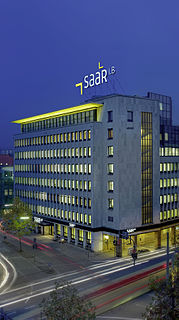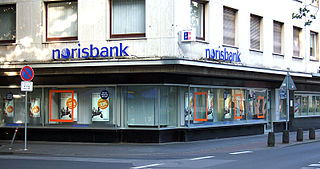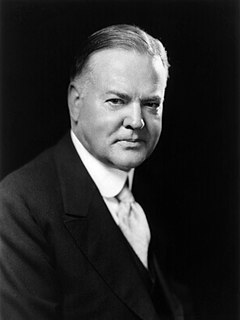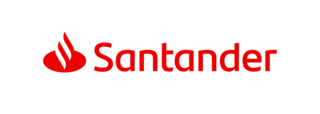 W
WCorporate finance is the area of finance that deals with sources of funding, the capital structure of corporations, the actions that managers take to increase the value of the firm to the shareholders, and the tools and analysis used to allocate financial resources. The primary goal of corporate finance is to maximize or increase shareholder value.
 W
WA banker's acceptance is an instrument representing a promised future payment by a bank. The payment is accepted and guaranteed by the bank as a time draft to be drawn on a deposit. The draft specifies the amount of funds, the date of the payment, and the entity to which the payment is owed. After acceptance, the draft becomes an unconditional liability of the bank. Banker's acceptances are distinguished from ordinary time drafts in that ownership is transferable prior to maturity, allowing them to be traded in the secondary market.
 W
WThe Berlin Hyp AG, based in Berlin, is one of the large German real estate and mortgage banks. The bank was created in 1996 from the merger of Berliner Hypotheken- und Pfandbriefbank AG and Braunschweig-Hannoversche Hypothekenbank AG.
 W
WBorrowing base is an accounting metric used by financial institutions to estimate the available collateral on a borrower's assets in order to evaluate the size of the credit that may be extended. Typically, the calculation of borrowing base is used for revolving loans, and the borrowing base determines the maximum credit line available to the borrower. Occasionally, borrowing base is also used to determine the maximum size of a term loan. Depending on the contractual terms of the loan, the assets included in the calculation of the borrowing base may be used as collateral for the loan.
 W
WCapital budgeting, and investment appraisal, in corporate finance, is the planning process used to determine whether an organization's long term investments such as new machinery, replacement of machinery, new plants, new products, and research development projects are worth the funding of cash through the firm's capitalization structure. It is the process of allocating resources for major capital, or investment, expenditures. One of the primary goals of capital budgeting investments is to increase the value of the firm to the shareholders.
 W
WCapital structure in corporate finance is the mix of various forms of external funds, known as capital, used to finance a business. It consists of shareholders' equity, debt, and preferred stock, and is detailed in the company's balance sheet. The larger the debt component is in relation to the other sources of capital, the greater financial leverage the firm is said to have. Too much debt can increase the risk of the company and reduce its financial flexibility, which at some point creates concern among investors and results in a greater cost of capital. Company management is responsible for establishing a capital structure for the corporation that makes optimal use of financial leverage and holds the cost of capital as low as possible.
 W
WA cash flow is a real or virtual movement of money:a cash flow in its narrow sense is a payment, especially from one central bank account to another; the term 'cash flow' is mostly used to describe payments that are expected to happen in the future, are thus uncertain and therefore need to be forecast with cash flows; a cash flow is determined by its time t, nominal amount N, currency CCY and account A; symbolically CF = CF(t,N,CCY,A). it is however popular to use cash flow in a less specified sense describing (symbolic) payments into or out of a business, project, or financial product.
 W
WCash flow forecasting is the process of obtaining an estimate or forecast of a company's future financial position; the cash flow forecast is typically based on anticipated payments and receivables. See Financial forecast for general discussion re methodology.
 W
WThe term clawback or claw back refers to any money or benefits that have been given out, but are required to be returned due to special circumstances or events, such as the monies having been received as the result of a financial crime, or where there is a clawback provision in the executive compensation contract.
 W
WA commercial mortgage is a mortgage loan secured by commercial property, such as an office building, shopping center, industrial warehouse, or apartment complex. The proceeds from a commercial mortgage are typically used to acquire, refinance, or redevelop commercial property.
 W
WCommercial paper, in the global financial market, is an unsecured promissory note with a fixed maturity of rarely more than 270 days. In layperson terms, it is like an "IOU" but can be bought and sold because its buyers and sellers have some degree of confidence that it can be successfully redeemed later for cash, based on their assessment of the creditworthiness of the issuing company.
 W
WCommon stock is a form of corporate equity ownership, a type of security. The terms voting share and ordinary share are also used frequently outside of the United States. They are known as equity shares or ordinary shares in the UK and other Commonwealth realms. This type of share gives the stockholder the right to share in the profits of the company, and to vote on matters of corporate policy and the composition of the members of the board of directors.
 W
WIn finance, a convertible bond or convertible note or convertible debt is a type of bond that the holder can convert into a specified number of shares of common stock in the issuing company or cash of equal value. It is a hybrid security with debt- and equity-like features. It originated in the mid-19th century, and was used by early speculators such as Jacob Little and Daniel Drew to counter market cornering.
 W
WCourt auction is an auction which takes place at a public location designated by the court.
 W
WDAB BNP Paribas is a brand of the German branch of the French major bank BNP Paribas with business premises in Munich. The BNP Paribas brand for independent asset managers, fund brokers, investment advisers and institutional clients was founded on 18 January 1994 as the first discount broker in Germany, trading under Direkt Anlage- und Vermögensverwaltungs-GmbH, and started operations in May 1994 as Direkt Anlage Bank GmbH (DAB). As of 1 January 2016, the operating private customer business was transferred to the BNP Paribas S.A. branch Germany. On 12/13 November 2016, the DAB bank's online portal was shut down and all private customers transferred to Consorsbank.
 W
WIn corporate finance, a debenture is a medium- to long-term debt instrument used by large companies to borrow money, at a fixed rate of interest. The legal term "debenture" originally referred to a document that either creates a debt or acknowledge it, but in some countries the term is now used interchangeably with bond, loan stock or note. A debenture is thus like a certificate of loan or a loan bond evidencing the company's liability to pay a specified amount with interest. Although the money raised by the debentures becomes a part of the company's capital structure, it does not become share capital. Senior debentures get paid before subordinate debentures, and there are varying rates of risk and payoff for these categories.
 W
WThe Degussa Bank AG, based in Frankfurt, is a German universal bank.
 W
WThe Deutsche Hypothekenbank (Actien-Gesellschaft) is a Mortgage bank based in Hanover, which specializes in the financing of commercial real estate and the capital market business with domestic and foreign clients. It is a company of NORD/LB and forms the center of excellence for the core business area Commercial Real Estate Financing. The bank employs around 400 people at its five domestic locations in Hanover, Berlin, Frankfurt, Hamburg and Munich as well as its foreign locations in Amsterdam, London, Paris, Madrid and Warsaw. With a balance sheet total of almost €23.7 billion, the Deutsche Hypo is one of Germany's largest real estate financiers.
 W
WEarnings per share (EPS) is the monetary value of earnings per outstanding share of common stock for a company.
 W
WIn finance and economics, divestment or divestiture is the reduction of some kind of asset for financial, ethical, or political objectives or sale of an existing business by a firm. A divestment is the opposite of an investment. Divestiture is an adaptive change and adjustment of a company's ownership and business portfolio made to confront with internal and external changes.
 W
WDue diligence is the investigation or exercise of care that a reasonable business or person is normally expected to take before entering into an agreement or contract with another party or an act with a certain standard of care.
 W
WEarnings per share (EPS) is the monetary value of earnings per outstanding share of common stock for a company.
 W
WEmployee stock options (ESO) is a label that refers to compensation contracts between an employer and an employee that carries some characteristics of financial options.
 W
WExaminership is a process in Irish law whereby the protection of the Court is obtained to assist the survival of a company. It allows a company to restructure with the approval of the High Court.
 W
WFactoring is a financial transaction and a type of debtor finance in which a business sells its accounts receivable to a third party at a discount. A business will sometimes factor its receivable assets to meet its present and immediate cash needs. Forfaiting is a factoring arrangement used in international trade finance by exporters who wish to sell their receivables to a forfaiter. Factoring is commonly referred to as accounts receivable factoring, invoice factoring, and sometimes accounts receivable financing. Accounts receivable financing is a term more accurately used to describe a form of asset based lending against accounts receivable. The Commercial Finance Association is the leading trade association of the asset-based lending and factoring industries.
 W
WIn finance, flow trading occurs when a firm trades stocks, bonds, currencies, commodities, their derivatives, or other financial instruments, with funds from a client, rather than its own funds.
 W
WA French auction is a multiple-price auction used for pricing initial public offerings.
 W
WGross margin is the difference between revenue and cost of goods sold (COGS), divided by revenue. Gross margin is expressed as a percentage. Generally, it is calculated as the selling price of an item, less the cost of goods sold, then divided by the same selling price. "Gross margin" is often used interchangeably with "gross profit", however the terms are different: "gross profit" is technically an absolute monetary amount and "gross margin" is technically a percentage or ratio.
 W
WHauck & Aufhäuser Privatbankiers AG is a private bank based in Frankfurt am Main. Hauck & Aufhäuser also maintains offices in Munich, Hamburg, Düsseldorf, Cologne, London, Luxembourg, Nanjing (China) and Shanghai (China) and focuses on the advisory and asset management of private and corporate clients as well as institutional investors and on cooperation with independent asset managers. The bank was created in 1998 from the merger of Georg Hauck & Sohn Bankiers in Frankfurt am Main and Bankhaus H. Aufhäuser in Munich. Since 2016 it has been part of the Chinese conglomerate Fosun. In March 2020 Hauck & Aufhäuser announced its intention to buy Bankhaus Lampe KG from the Oetker Group. The purchase is subject to approval by the competition authorities.
 W
WHYPO NOE Landesbank für Niederösterreich und Wien AG is one of the oldest and largest regional banks in Austria. Within the Group, HYPO NOE Landesbank is a partner for the public sector, real estate and key accounts as well as private and business customers in the core market of Lower Austria, Vienna and selectively in the Danube region. The Province of Lower Austria is the 100 percent owner of the bank.
 W
WThe Landesbank Saar is a public-law corporation established in Saarbrücken and the largest credit and mortgage bond institute in Saarland. In 2017, the balance sheet total was around €14 billion. Core markets are Saarland and France, especially the northeast of the country.
 W
WManagerial finance is the branch of finance that concerns itself with the managerial application of finance techniques and theory, emphasizing the financial aspects of managerial decisions. The techniques addressed are drawn in the main from managerial accounting and corporate finance; the former allow management to better understand, and hence act on, financial information relating to profitability and performance; the latter are about optimizing the overall financial-structure.
 W
WIn corporate finance, mergers and acquisitions (M&A) are transactions in which the ownership of companies, other business organizations, or their operating units are transferred or consolidated with other entities. As an aspect of strategic management, M&A can allow enterprises to grow or downsize, and change the nature of their business or competitive position.
 W
WIn accounting, minority interest is the portion of a subsidiary corporation's stock that is not owned by the parent corporation. The magnitude of the minority interest in the subsidiary company is generally less than 50% of outstanding shares, or the corporation would generally cease to be a subsidiary of the parent.
 W
WIn corporate finance, net operating profit after tax (NOPAT) is a company's after-tax operating profit for all investors, including shareholders and debt holders. NOPAT is used by analysts and investors as a precise and accurate measurement of profitability to compare a company's financial results across its history and against competitors.
 W
WThe Norisbank GmbH is a German bank with headquarters in Bonn. Since 2 November 2006, it has been a subsidiary of Deutsche Bank and since 27 July 2012 purely a direct bank.
 W
WA number of top executives in large businesses and governments have worked for a one-dollar salary. One-dollar salaries are used in situations where an executive wishes to work without direct compensation, but for legal reasons must receive a payment above zero, so as to distinguish them from a volunteer. The concept first emerged in the early 1900s, where various leaders of industry in the United States offered their services to the government during times of war. Later, in the late 1990s and early 2000s, many business executives began accepting one-dollar salaries—often in the case of struggling companies or startups—with the potential for further indirect earnings as the result of their ownership of stock.
 W
WParticipating preferred stock is preferred stock that provides a specific dividend that is paid before any dividends are paid to common stock holders, and that takes precedence over common stock in the event of a liquidation. This form of financing is used by private equity investors and venture capital (VC) firms. Holders of participating preferred stock have the choice between two payoffs: a liquidation preference or an optional conversion. In a liquidation, they first get their money back at the original purchase price, the balance of any proceeds is then shared between common and participating preferred stock as though all convertible stock was converted. In an optional conversion, all shares are converted into common stock. Holders of participating preferred stock will always pick the option with the highest payoff.
 W
WPreferred stock is a component of share capital that may have any combination of features not possessed by common stock, including properties of both an equity and a debt instrument, and is generally considered a hybrid instrument. Preferred stocks are senior to common stock but subordinate to bonds in terms of claim and may have priority over common stock in the payment of dividends and upon liquidation. Terms of the preferred stock are described in the issuing company's articles of association or articles of incorporation.
 W
WProCredit Bank AG Deutschland is a bank based in Frankfurt, Germany, and is a fully owned subsidiary of ProCredit Holding AG & Co. KGaA. It supports the ProCredit group worldwide in various business areas and offers banking services for small and medium-sized enterprises (SMEs) as well as for private individuals. ProCredit Bank is the most recently established bank in the ProCredit group, which operates primarily in Southeastern and Eastern Europe as well as in Ecuador.
 W
WA rights issue or rights offer is a dividend of subscription rights to buy additional securities in a company made to the company's existing security holders. When the rights are for equity securities, such as shares, in a public company, it is a non-dilutive(can be dilutive) pro rata way to raise capital. Rights issues are typically sold via a prospectus or prospectus supplement. With the issued rights, existing security-holders have the privilege to buy a specified number of new securities from the issuer at a specified price within a subscription period. In a public company, a rights issue is a form of public offering.
 W
WThe Santander Consumer Bank AG is a German Credit Institution in the legal form of a corporation with headquarters in Mönchengladbach. It is a wholly owned subsidiary of the Spanish Banco Santander S.A.
 W
WThe Sparkasse Mittelholstein AG, based in Rendsburg, is one of five free public savings banks existing in Germany.
 W
WThe stakeholder theory is a theory of organizational management and business ethics that accounts for multiple constituencies impacted by business entities like employees, suppliers, local communities, creditors, and others. It addresses morals and values in managing an organization, such as those related to corporate social responsibility, market economy, and social contract theory.
 W
WIn finance, stock consists of all of the shares into which ownership of a corporation or company is divided. A single share of the stock means fractional ownership of the corporation in proportion to the total number of shares. This typically entitles the shareholder (stockholder) to that fraction of the company's earnings, proceeds from liquidation of assets, or voting power, often dividing these up in proportion to the amount of money each stockholder has invested. Not all stock is necessarily equal, as certain classes of stock may be issued for example without voting rights, with enhanced voting rights, or with a certain priority to receive profits or liquidation proceeds before or after other classes of shareholders.
 W
WStrategic financial management is the study of finance with a long term view considering the strategic goals of the enterprise. Financial management is nowadays increasingly referred to as "Strategic Financial Management" so as to give it an increased frame of reference.
 W
WSupply chain financing is a form of financial transaction wherein a third party facilitates an exchange by financing the supplier on the customer's behalf. Also it refers to the techniques and practices used by banks and other financial institutions to manage the capital invested into the supply chain and reduce risk for the parties involved.
 W
WThe trade-off theory of capital structure is the idea that a company chooses how much debt finance and how much equity finance to use by balancing the costs and benefits. The classical version of the hypothesis goes back to Kraus and Litzenberger who considered a balance between the dead-weight costs of bankruptcy and the tax saving benefits of debt. Often agency costs are also included in the balance. This theory is often set up as a competitor theory to the pecking order theory of capital structure. A review of the trade-off theory and its supporting evidence is provided by Ai, Frank, and Sanati.
 W
WA treasury stock or reacquired stock is stock which is bought back by the issuing company, reducing the amount of outstanding stock on the open market.
 W
WThe Umweltbank AG is a German direct bank that exclusively finances ecological loan projects with its customer deposits.
 W
WVenture capital (VC) is a form of private equity financing that is provided by venture capital firms or funds to startups, early-stage, and emerging companies that have been deemed to have high growth potential or which have demonstrated high growth. Venture capital firms or funds invest in these early-stage companies in exchange for equity, or an ownership stake. Venture capitalists take on the risk of financing risky start-ups in the hopes that some of the firms they support will become successful. Because startups face high uncertainty, VC investments have high rates of failure. The start-ups are usually based on an innovative technology or business model and they are usually from the high technology industries, such as information technology (IT), clean technology or biotechnology.
 W
WThe Volksbank Bielefeld-Gütersloh eG is a regional cooperative bank based in the East Westphalian district town of Gütersloh. With a balance sheet total of € 4.44 billion, it is the third-largest Volksbank in North Rhine-Westphalia and, with 108,600 members, the largest association of individuals in the Ostwestfalen-Lippe region. The bank emerged from the merger of the Volksbank Gütersloh with the smaller Bielefelder Volksbank on May 22, 2014.
 W
WVoting interest in business and accounting means the total number, or percent, of votes entitled to be cast on the issue at the time the determination of voting power is made, excluding a vote which is contingent upon the happening of a condition or event which has not occurred at the time.
 W
WIn finance, a warrant is a security that entitles the holder to buy the underlying stock of the issuing company at a fixed price called exercise price until the expiration date.